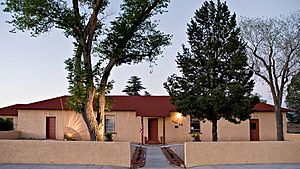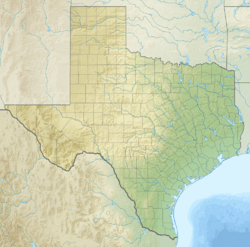Fort D. A. Russell (Texas) facts for kids
Quick facts for kids |
|
|
Fort D.A. Russell Historic District
|
|
| Location | Roughly bounded by Ridge, El Paso, Kelly Sts, US 67 and RM 2810 |
|---|---|
| Nearest city | Marfa, Texas |
| Area | 426.9 acres (172.8 ha) |
| NRHP reference No. | 06001152 |
| Added to NRHP | December 14, 2006 |
Fort D. A. Russell was an important United States Army base located near Marfa, Texas. It was used by the military from 1911 to 1946. The fort was named after David Allen Russell, a general who fought in the American Civil War. He died in battle on September 19, 1864.
Contents
Early Days of Fort D. A. Russell
Fort D. A. Russell first opened in 1911. It was called Camp Albert back then. Its main job was to protect West Texas from groups crossing the border. The base was home to cavalry (soldiers on horseback) and air units. These units helped keep the area safe after attacks like the one led by Pancho Villa.
Growing During World War I
During World War I, the base became much bigger. It was renamed Camp Marfa. After the war, it became the main office for the Marfa Command. In 1924, a special group called the Mounted Watchmen was formed. Their job was to stop people from illegally crossing the Rio Grande River into the United States.
Renamed Fort D. A. Russell
In 1930, the base was given its final name, Fort D. A. Russell. This name had been used for another military base in Wyoming. That base was renamed, so the name "Fort D. A. Russell" became available for the Texas location.
Fort D. A. Russell During the Great Depression
The base was closed for a short time during the Great Depression. On January 2, 1933, the Army shut it down. But it reopened in 1935. It then became the home base for the 77th Field Artillery unit.
Fort D. A. Russell in World War II
During World War II, Fort D. A. Russell grew even more. It was used as an air base and a training center. A unit of the WAC was also stationed there. Soldiers trained at the fort to guard the U.S.-Mexican border. The Marfa Army Airfield was built nearby. It was used to train pilots for the war.
The base also held prisoners of war from Germany. They stayed in a special camp on the base.
After the Wars: Fort D. A. Russell Closes
After World War II ended, the fort was closed. This happened as America reduced its military size. On October 23, 1946, the base was given to the Corps of Engineers. Soon after, the Texas National Guard took control. By 1949, most of the land was sold to people living nearby.
Fort D. A. Russell Becomes an Art Center
In the late 1970s, an artist named Donald Judd bought the old fort. He started turning the buildings into places to show large art pieces. His idea was to create a museum for art that would stay there permanently.

Judd's museum opened in 1986. It is now known as the Chinati Foundation. Today, it shows art by Judd and many other famous artists.
Building 98: A Historic Spot
One important building at Fort D. A. Russell is Building 98. It is part of the International Woman's Foundation. This building is famous for its World War II German POW murals. These murals were painted in 1945 by Hans Jürgen Press and Robert Humpel. They were German prisoners of war held at the base.
Building 98 was once a place for officers to live and relax. The International Woman's Foundation helped get Fort D. A. Russell listed on the National Register of Historic Places. Since 2002, the Foundation has run an artist-in-residency program and a museum at the base. Mona Blocker Garcia started the foundation in 2002. Her goal was to preserve the fort's history exactly as it was when it closed.
 | Delilah Pierce |
 | Gordon Parks |
 | Augusta Savage |
 | Charles Ethan Porter |



